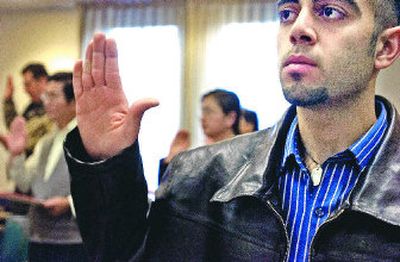Iraqi refugee sworn in as citizen

Ali Albakriy fled Iraq to avoid military service under Saddam Hussein only to return to his native land as an interpreter for the U.S. Army.
On Tuesday, the 24-year-old’s dream of becoming an American came true as he and 47 other immigrants from around the world were sworn in as citizens by U.S. Magistrate Cynthia Imbrogno in Spokane.
Albakriy’s journey began in 2000 when he and his mother left Iraq and a regime they opposed.
“We didn’t believe in it,” Albakriy said. “I ran away to Jordan and became a refugee.”
He arrived in the United States in 2001, and settled in Kennewick, where he works in auto sales. His wife, Karla, also is a naturalized citizen, having emigrated from Guadalajara, Mexico.
They met at a Tri-Cities Wal-Mart, she said.
In 2005, Albakriy worked as an interpreter for U.S. forces in Iraq, including duty at the infamous Abu Ghraib prison, after revelations of the abuse of prisoners there.
He said he was shot at three times while accompanying U.S. military convoys transferring prisoners. Still, he intends to go back.
Now that he has his citizenship, he can obtain higher security clearance as a contract employee of the Army.
“It’s good money,” Albakriy said. He was not permitted to say how much he stood to earn, “but it’s good.”
Albakriy is fortunate. An estimated 40,000 to 50,000 Iraqis are being displaced by violence every month, according to information released this month by the office of the U.N. High Commissioner for Refugees.
Only 466 Iraqis have been admitted into the United States since the war began in 2003.
The UNHCR recently estimated that nearly 2 million Iraqis have fled to neighboring countries, while 1.7 million Iraqis are displaced inside Iraq. Before the war, Iraq had a population of 21 million.
In its January appeal for $60 million in emergency aid, the UNHCR said, “The current exodus is the largest population movement in the Middle East since Palestinians were displaced following the creation of the state of Israel in 1948.”
Yet Albakriy believes there is hope for peace in his native land, where fighting along religious and ethnic lines has increased dramatically since the February bombing of a Shiite shrine in Samarra.
His father is Sunni, he said, and his mother is Shiite.
“We are both Muslim,” he said. “We both pray the same.”